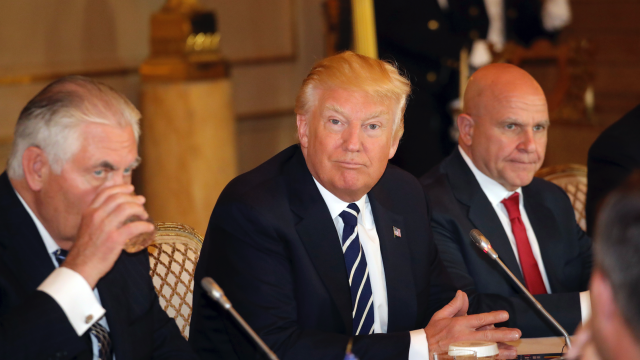Republican senators are reportedly planning to send President Trump a legally dubious letter asking him to withdraw the US from the Paris Agreement, a historic accord to combat climate change. Although EPA head Scott Pruitt and others have said they want the US to withdraw, Trump faces intense pressure to stay in from China’s President Xi, the Pope and members of his inner circle. He has repeatedly delayed making any final decision on the matter.
First reported by Axios Thursday, the letter urging US withdrawal reportedly includes signatures from 22 Republican senators, including Majority Leader Mitch McConnell and John Barrasso, Jim Inhofe, both high ranking members of the Senate Committee on Environment and Public Works. Axios’ report emphasised one line in particular as girding the senators’ logic behind the exit:
Because of existing provisions within the Clean Air Act and others embedded in the Paris Agreement, remaining in it would subject the United States to significant litigation risk that could upend your Administration’s ability to fulfil its goal of rescinding the Clean Power Plan. Accordingly, we strongly encourage you to make a clean break from the Paris Agreement.
The letter essentially argues that the US is open to being sued if it doesn’t meet the carbon emissions goals of the Paris Agreement. That isn’t a misconception. It’s a lie. Plain and simple.
Alden Meyer, director of strategy and policy for the Union of Concerned Scientists, explained to Gizmodo via email that the argument “already been has been debunked by any number of international legal experts, including several of those on the US delegation who negotiated the Paris agreement”.
First, no one can litigate the US for failing its goals. The Paris Agreement is simply a series of individual targets for reductions in carbon emissions. The targets are voluntary, and there’s no consequence for missing them. It doesn’t grant authority to the UN or anyone else to go after the US if the country fails its carbon emissions goals. (As an aside, environmental deregulation by Pruitt and Trump is the reason the US probably will fail its carbon emissions goals.)
Second, rescinding the Clean Power Plan, a state-by-state series of carbon emissions goals created by Obama, has nothing to do with Paris withdrawal. Meyer explained via email that, while there may be legal consequences to how quickly Trump wants to repeal the CPP, they don’t stem from Paris, but from the US Supreme Court:
The Trump administration does face legal hurdles to their efforts to dismantle the Clean Power Plan and other domestic climate action policies, but they arise from US, not international law, especially stemming from the Supreme Court decision in Massachusetts vs. EPA, and the EPA’s endangerment finding in response to that decision. In essence, having determined that greenhouse gas emissions pose a real threat to public health and welfare, EPA cannot simply do away with the CPP and not replace it with some alternative response measures.
So, if the Trump administration manages to fully repeal the Clean Power Plan, the EPA is still legally required to enact policies that meaningfully protect people from greenhouse gases. That’s what the endangerment finding is. The reason repealing the CPP won’t be easy is that the EPA, under Pruitt, hasn’t put forth anything to replace the CPP with that will still fulfil the endangerment finding’s requirement that carbon be regulated under the Clean Air Act. If Pruitt puts forth an ineffective rewriting of the CPP or undoes it all together, he’s violating US federal law.
This is one of the reasons Pruitt’s soft denial of climate change, both during his confirmation hearing and again in March, is so disturbing. By pushing the lie that there isn’t conclusive evidence human activity is the dominant cause of global warming, Pruitt is subtly pushing against the endangerment finding, which conservative groups would like to do away with entirely.
The endangerment finding is core to many of the EPA’s climate regulations. This letter presents it, bizarrely, as a vulnerability, while conflating the protections it’s meant to afford Americans with the protections implementation of the the Paris Agreement would offer the entire planet.
[Axios]
